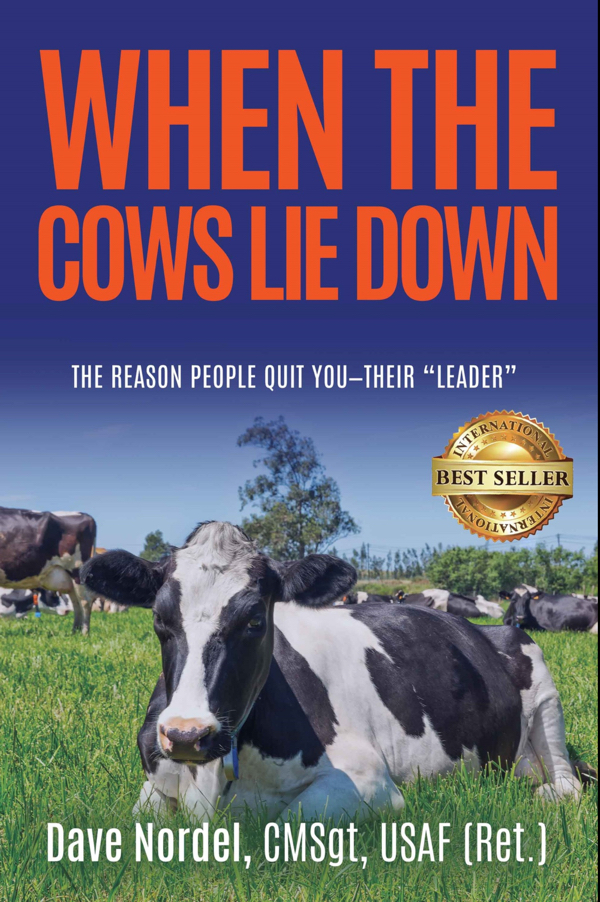Retired Air Force Chief Master Sergeant Dave Nordel, who grew up on an Orland farm, shares leadership lessons drawn from his experiences in agriculture and the military. In his new book, “When The Cows Lie Down,” Nordel emphasizes the importance of noticing subtle signs and maintaining a positive attitude to lead effectively.
Leadership learned through farming, military | The Biblio File

Key Takeaways:
- Early farm experiences shaped Nordel’s leadership approach.
- Noticing subtle signs is crucial in preventing team issues.
- Leadership involves being a trainer, cheerleader, and mentor.
- Attitude significantly impacts leadership effectiveness.
- Personal stories can provide universal leadership lessons.
From Farm Fields to Battlefields
Retired Air Force Chief Master Sergeant Dave Nordel’s journey began on a farm in Orland, where the cows taught him wisdom that would later guide his military career. In his new book, When The Cows Lie Down: The Reason People Quit You—Their ‘Leader’ , Nordel explores how the lessons from his rural upbringing shaped his approach to leadership.
Roles of a Leader
“As I grew older,” Nordel reflects, “and became a contributor to the daily activities it takes to run a farm or an orchard… this required a few roles to ensure I did it right. One role is a trainer and leader, one is a cheerleader, and one is a mentor.” These early responsibilities instilled in him the multifaceted nature of effective leadership.
The Significance of Subtle Signs
One of Nordel’s cherished memories is starting the day with coffee and fresh cream, “squirted… right from the cow into the cup. It was heaven.” But more than the simple pleasures, he learned to observe the animals closely. Years later, aboard a fishing boat, he noticed cows near the dock hunkered down—a telltale sign of impending bad weather.
He poses a critical question to today’s leaders: “What are the cows doing? Do you still check, do you notice the changes, or have you quit paying attention to the subtle (or not-so-subtle) signs of a pending storm, illness, or problem with our followers or processes?” Nordel emphasizes that attentiveness can prevent small issues from becoming significant problems.
Lessons from the Battlefield
Nordel’s experiences as a medic in Iraq further reinforced the importance of leadership vigilance. Facing “terrible incidents of suicide and near-death, self-inflicted injuries,” he realized the consequences of “what we quit noticing or doing.” The battlefield taught him that lives depend on a leader’s ability to stay connected and attentive to their team.
Maximum Fabulous Attitudes
Transitioning from military service to consultancy, Nordel founded Max Fab Consulting (maxfabconsulting.com), encouraging leaders to adopt “Maximum Fabulous” attitudes. It’s about bringing one’s best to any situation—whether it’s a war zone or an office environment where team members might be “lying down” or quietly disengaging.
The Power of Attitude
Nordel recounts the influence of Paul, his First Sergeant—or “Shirt” as they fondly called him—who battled severe cancer. “He was scared—not scared of dying but scared of quitting. He didn’t want to quit his people, quit his family, and not answer the call.” Paul’s unwavering commitment left a lasting impression on Nordel, who underscores that “attitude is everything.”
A Blueprint for Compassionate Leadership
When The Cows Lie Down exemplifies vulnerable, compassionate, and effective leadership. Through personal anecdotes and hard-earned wisdom, Nordel offers a guide for leaders striving to keep their teams engaged and motivated. His message is clear: by paying attention to those we lead and maintaining a positive outlook, we can prevent quiet quitting and foster a more committed, resilient workforce.











